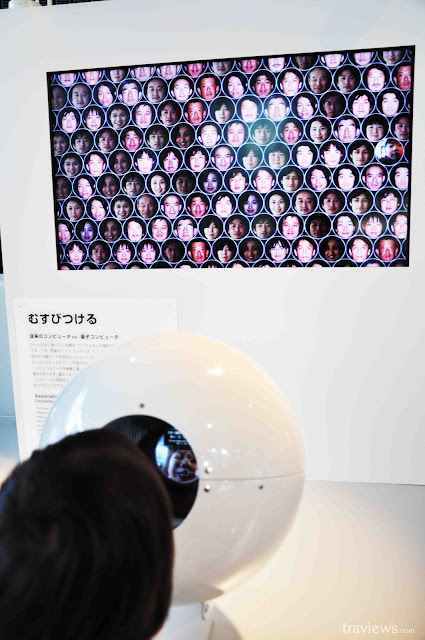I admit it. I'm a museum geek. It was one of my favorite parts about school—going on a class field trip—and I always felt that I learned a lot from visiting museums. I especially enjoy visiting art museums, but it's not the smartest trip to make with toddlers. We once went to Mori Art Museum in Roppongi Hills because it was part of the admission ticket with Tokyo City View and Sky Aquarium. It was one of the most stressful trips with the kids because we were constantly making sure our kids weren't grabbing everything in sight that cost thousands of dollars. I don't blame them. If I saw cool things made out of glass and other odd objects, I would want to touch them, too. Now that I think about it, that was the first and last contemporary art museum that we've visited in Tokyo.
We have already visited train, fire, airplane, children, and trick art museums, so I wanted to take there somewhere different. That's when I thought of taking them to a science museum, surely they would have a lot of hands-on exhibits so I wouldn't have to worry about my kids breaking anything (well, hopefully).
I took the kids to Miraikan, the National Museum of Emerging Science and Innovation this past weekend. While its information may be geared to junior high students and older, I found many activities that entertained my toddlers. In fact, there were a lot of children, including other toddlers, that were visiting Miraikan the same day as us, and everyone seemed to enjoy the exhibits.
We usually drive to Odaiba, so this was our first train ride to the city. We all enjoyed riding around Tokyo Bay. This is the view of Odaiba, Tokyo Bay, and the Rainbow Bridge.
A bit blurry since the train was moving as I snapped away, but this is a picture of Tokyo Bay, the Rainbow Bridge, and Tokyo from Odaiba.
We exited at Telecom Center station, but we probably could have exited Funeno-Kagakukan station, too (and saving some yen), since the museum was about the same walking distance from each station.
This giant globe of the Earth is fascinating as the images are constantly moving around the globe. We just watched Planet 51 last week, so when TJ saw the globe, he said, "It's Earth!"
TJ enjoying having his face studied by a quantum computer.
Watching robotic dog in action.
I'm pretty sure I know what these kids want to take home with them. They would return back to the demonstration between visiting other exhibits.
So it looks like an iPod commercial in the club, but it's actually an exhibit called Songs of ANAGURA, which focuses on spacial information science. By collecting data based on our movements in our everyday lives, it aims at studying how we can support other individuals, other societies, and the world.
It's really cool because when you enter the exhibit, you have a colorful buddy at your feet, which is called "ME." It has hands and eyes, which blink and move while you move. The experiences you have in the ANAGURA is turned into information that triggers changes in ME. I wonder if it can tell this is a child having fun playing with it.
Hands-On Model of the Internet
TJ turned a dial to his initial, T, on this board. Afterwards, he placed 16 balls in a roll, and then pressed the big, black button. We watched the balls move from the table to the "terminal" and back down to another little table next to it, which lit up with the letter T. This was a simple representation of what happens in machines when messages are transmitted between computers and mobile phones.
The globe changes colors! It was actually a fiery red the moment before I snapped this photo.
In the Mural of Human Technology exhibition room.
We left the 3rd floor, which contained the Information Science & Technology for Society and Innovation & the Future exhibitions, and went towards the 5th floor, which had the Earth Environment & Frontiers and Life Science exhibitions.
View of the 1st, 3rd, and 5th floors. The first floor had a special exhibition, which is currently UMESAO Tadao: An Explorer for the Future, which demonstrated the tools and methods of Umesao Tadao, a science professor, in intellectual production.
CJ sitting in a Space Habitation Module, which is an exhibition that shows what would be needed to live in a community outside of Earth.
LE-7A rocket engine, which is used in the first stage of Japan's main rocket, H-11A.
Actual-size model of the Shinkai 6500, the world's deepest manned research submersible that can dive down to 6,500 meters.
The kids checking out the cockpit.
After the museum closed, we walked towards the beach. On the way there, we saw Gundam, a giant robot!
Other than Mt. Fuji, I am in love with seeing Tokyo Tower and the Rainbow Bridge at night.
While we walked along the boardwalk in front of Aqua City and Decks malls, we saw this huge, gaudy heart. I love hearts, and since Valentine's Day is coming up, I had to take a photo of the kids in it! Press the button, and it lights up the night, attracting large groups of [cough*drunk*cough] people, couples, and families to stop and take fun photos. Very entertaining!
Happy Valentine's Day from Odaiba!
National Museum of Emerging Science & Innovation
Hours: 10:00 am - 5:00 pm / Not open every Tuesday
Admission: ¥600 Adults / <18 ¥200 / Free for <18 on Saturdays
Website: http://www.miraikan.jst.go.jp/en/







































0 Comentarios